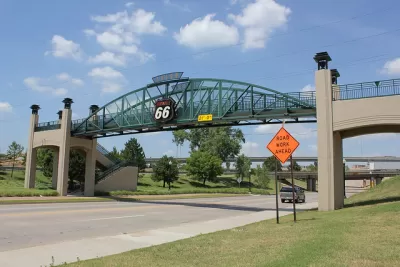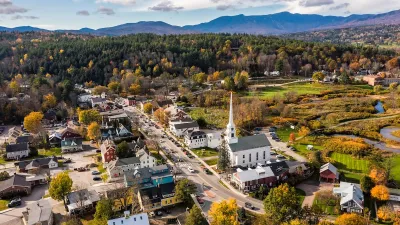Smaller cities are luring newly untethered workers with cash incentives, bikes, and other local perks.

As more Americans shift to remote work, towns and states are seizing the opportunity to attract new residents, writes Patrick Sisson. Regions like Tucson and Northwest Arkansas have developed "marketing campaigns aimed at convincing young, hungry talent to take a gamble on a new place alongside a less romantic reason to explore a new city: cold, hard cash."
By offering financial incentives to defray moving costs, cities are grabbing the attention of the new "Zoom commuter workforce." Incentive programs vary, with cities and states offering a combination of cash and "other amenities, such as co-working memberships, homeownership programs, and meetups to help new arrivals get rooted in the community." Northwest Arkansas' Life Works Here initiative "provides $10,000 and a mountain bike, a nod to the area’s famous trail network."
"This is the 'revenge of the small city,' says Liz Pocock, who oversees Remote Tucson, the Arizona city’s nascent incentive program that launched in November. In an era when talent has finally been uncoupled from an office, the economic competition between cities isn’t just about marquee companies and their headquarters, she says. Now it’s about quality of life and natural amenities."
The concept of paying people to move began as a curious aberration in 2019, but gained steam as the pandemic suddenly untethered millions of workers. Now, it appears that "[t]hese quirky experiments may just be the future of economic development." However, some economic development experts warn that the programs could become unsustainable, making it "harder to lure new residents — or more expensive as everyone simply chases the highest incentive." Critics also point out that, without further investment in local education and infrastructure, moving incentives "ultimately move talent around and don’t develop it in their backyards."
FULL STORY: Why So Many Cities Are Now Paying Workers $10,000 to Relocate

Study: Maui’s Plan to Convert Vacation Rentals to Long-Term Housing Could Cause Nearly $1 Billion Economic Loss
The plan would reduce visitor accommodation by 25,% resulting in 1,900 jobs lost.

North Texas Transit Leaders Tout Benefits of TOD for Growing Region
At a summit focused on transit-oriented development, policymakers discussed how North Texas’ expanded light rail system can serve as a tool for economic growth.

Using Old Oil and Gas Wells for Green Energy Storage
Penn State researchers have found that repurposing abandoned oil and gas wells for geothermal-assisted compressed-air energy storage can boost efficiency, reduce environmental risks, and support clean energy and job transitions.

Santa Barbara Could Build Housing on County Land
County supervisors moved forward a proposal to build workforce housing on two county-owned parcels.

San Mateo Formally Opposes Freeway Project
The city council will send a letter to Caltrans urging the agency to reconsider a plan to expand the 101 through the city of San Mateo.

A Bronx Community Fights to Have its Voice Heard
After organizing and giving input for decades, the community around the Kingsbridge Armory might actually see it redeveloped — and they want to continue to have a say in how it goes.
Urban Design for Planners 1: Software Tools
This six-course series explores essential urban design concepts using open source software and equips planners with the tools they need to participate fully in the urban design process.
Planning for Universal Design
Learn the tools for implementing Universal Design in planning regulations.
Ascent Environmental
Borough of Carlisle
Caltrans
Institute for Housing and Urban Development Studies (IHS)
City of Grandview
Harvard GSD Executive Education
Toledo-Lucas County Plan Commissions
Salt Lake City
NYU Wagner Graduate School of Public Service





























